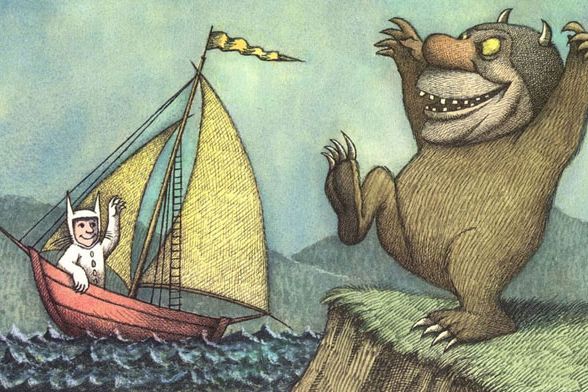Photo: Maurice Sendak/ ? 1963, 1991 by Maurice Sendak
The brilliant and hauntingly mischievous works of Maurice Sendak, who died today at 83, are as universal a staple of early childhood as a pacifier or a tantrum. One of our great intergenerational commonalities is the sense memory of sitting either on a parent’s lap or paging through the illustrations on a bedroom floor, both mesmerized and giddily unnerved by Sendak’s naughty protagonists: the stubborn Pierre who took nonviolent protest to lengths to which we would not dare; or Max, whose rebellious trip to the land of the Wild Things (finally, a culture that understands kids’ needs!) takes an unexpectedly traitorous turn (wait … they’re gonna eat him up? This breaks the misbehavioralist contract!). Herewith, our tribute to a man who never patronized children with worlds with sanded-off corners or reductively callow lessons, a gift that will never be out of date.
“Let the wild rumpus start!”
The author’s most towering achievement, this 1963 children’s book has more wise things to say about youth and anger and imagination than a dozen child development manuals.
The year before Wild Things, Sendak released a collection of slim books (Alligators All Around, Chicken Soup With Rice, One Was Johnny, Pierre) that serve as a mini-school for young kids. Each of the quartet is a lesson book of sorts — an alphabet primer, a tour through the months of the calendar, a book of numbers, and a “cautionary tale.”
This seventies children’s work, in which a young boy falls asleep, floats out his window, and ends up almost getting baked in an odd kitchen, has repeatedly been banned by communties, schools, and libraries on account of the book’s nudity (the little boy is completely naked, genitals and all, in some panels).
This 1981 tale of a young girl whose younger sister is kidnapped by goblins is not the direct source for Jim Henson’s 1986 David Bowie film Labyrinth, but the end credits do read, “Jim Henson acknowledges his debt to the works of Maurice Sendak.”
In 2003, Sendak and Angels in America playwright Tony Kushner released this book based on a Czech opera from the late thirties. It was received so well that Sendak was later able to co-design the sets for a new stage production. The author and Kushner built a deep friendship, and Sendak had a cameo as a rabbi in the HBO adaptation of Angels in America.







